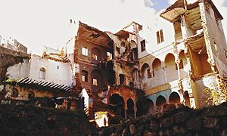Charles de Gaulle: Part 2 – The Post War Maze
Who was Charles de Gaulle?

In 1938, Winston Churchill described Russia as, “a riddle, wrapped in a mystery, inside an enigma”. During his long and tempestuous relationship with Charles de Gaulle, Churchill must have thought the same of the General on many occasions.
During his lifetime, de Gaulle had to confront many personal and political crises. Amongst others, he was a POW in the First World War. His daughter was born with Down Syndrome. And the Nazis overran his country.
Most scholars agree that his conduct during three critical periods was the foundation stone to the de Gaulle legacy:
1. his escape to London in 1940,
2. granting Algerian independence in 1962, and
3. the 1968 student riots.
Read Parts: 1, 2, and 3 of this mini-series in order to discover more details on each of these turning points.
The Post War Maze – Part 2
On VE Day, 8 May 1945, when the world was celebrating victory over the Nazis in Europe, rioting broke out in the Algerian town of Setif.
Muslim demonstrators unfurled Algerian flags, and violence resulted as police began confiscating them. The trouble escalated, and there were attacks on the pieds-noirs in the surrounding areas.
On the other side of the world, the rebellion in Indochina, known as ‘la sale guerre’, ended in the humiliating 1954 defeat of the French Army at Diên Biên Phu. Tens of thousands of Vietnamese and French soldiers were killed.
Restoring France to what he saw as its former glory became a de Gaulle obsession.
– He had been enraged at not having been invited to the Big Three conferences at Potsdam and Yalta.
– And he was determined that France should not be ignored or dictated to by the other world powers, especially America.
His primary post-war objective was to ensure that France had a seat at the top table with the status of equal among the victorious Allies.
He fought for, and succeeded in, securing one of the four occupation zones in Germany. To this end, independence from the influence of the cozy Anglo-American special relationship was the spine of the strategy he formulated. France becoming a nuclear power taking a neutral position on the American war in Vietnam, and his testy relationship with NATO, are examples of what he saw as French independence in world affairs.
At what cost?
When World War II ended, the cost of colonial empires, whether calculated in money or blood, came under question. There was a dramatic rise in nationalist movements in many European overseas territories. The French were under extreme pressure in both Vietnam and Algeria.

When the Front de libération nationale Algérie demanded independence, a full-scale insurrection broke out.
- As the uprising spread, French troops became more and more violent.
- Muslims without the white armbands they’d been instructed to wear were randomly shot.
- Vigilantes lynched prisoners taken from local jails. Torture was used on both sides.
- A French warship bombarded Muslim villages.
- Bomb attacks and terrorism became part of everyday life in France.
- The threat of a civil war spreading to the mainland became a reality.
Charles de Gaulle returned to power
When the Fourth Republic collapsed General de Gaulle returned to power after a twelve-year absence. He took charge and obtained public consent to control government policy himself with presidential authority.
On a visit to Algeria in 1958, he gave heart to the colons and the Army with his exclamation, “Je vous ai compris,” and “Vive l’Algerie francaise.”
But the General was nothing if not pragmatic. Not long afterwards, he fuelled the controversy when he used the words the ‘pieds-noirs‘ feared most: “government of Algeria by the Algerians.”

The situation quickly deteriorated. Barriers and roadblocks were erected and violence broke out.
This was “La semaine des barricades”.
Sensing a political opportunity, Front Nationale leader Jean-Marie le Pen called for the erection of barricades in Paris.
When the violence spread from Algeria to mainland France, de Gaulle in 1962 narrowly escaped an assassination attempt.
Several bombs exploded in Paris and in an effort to contain bloodshed in the capital, the Algerian community in Paris was subjected to a curfew. When they demonstrated against these conditions, the police responded with undisguised brutality. It is estimated that between fifty and three hundred civilians were drowned in the Seine by the police. Violence begets violence and bloody clashes continued for several months.
A clique of army officers in Algeria, hoping to preserve Algérie française, staged a military revolt against de Gaulle.
– The putsch did not succeed and a ceasefire with the nationalists came into effect.
– But French far-right elements staged a series of bombings in both Algeria and France.
Complicated negotiations
A lengthy period of complicated negotiations ensued. Finally, in an eleventh-hour volte-face de Gaulle, ever the pragmatic politician, pronounced Algeria independent. An estimated one million ‘pieds-noirs‘ fled to France. The Algerian war was over. An uneasy peace ensued, but any Muslims who had supported the French were massacred. According to the Algerians, some 45,000 people may have died during the uprising.
After the war, despite strained political relations between France and Algeria, economic ties related to oil and gas, have persisted.
But only a few years later, Paris was turned into a war zone again.
How much do you know about Charles de Gaulle? please share with us in the comments below.
NOTE: Many of the details in this article have been gleaned from Julian Jackson’s monumental 2018 biography, “Charles de Gaulle.”









